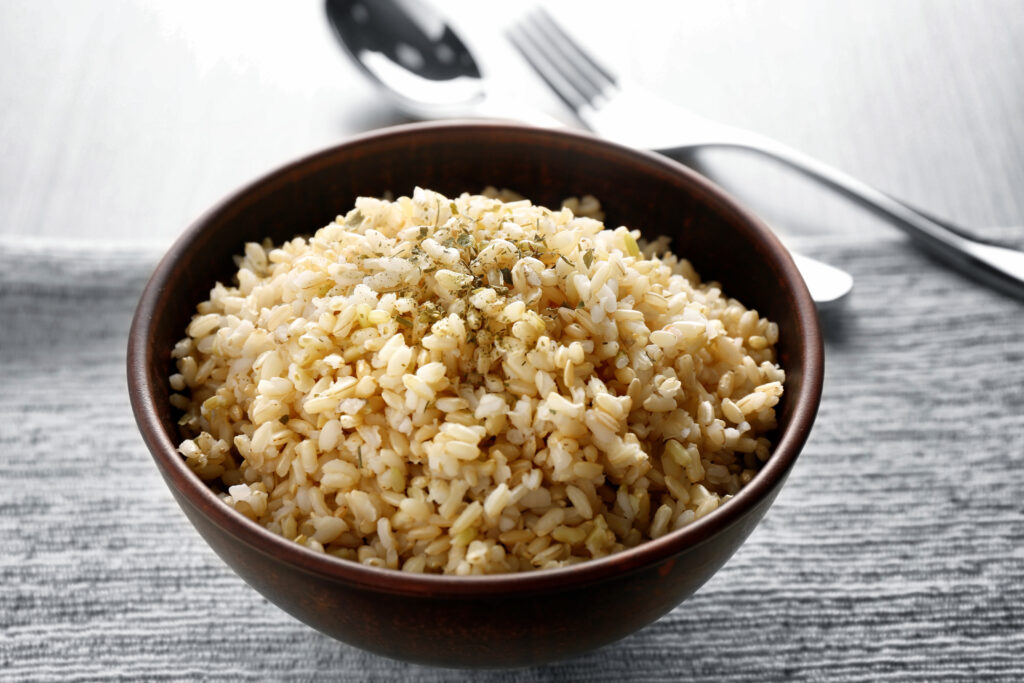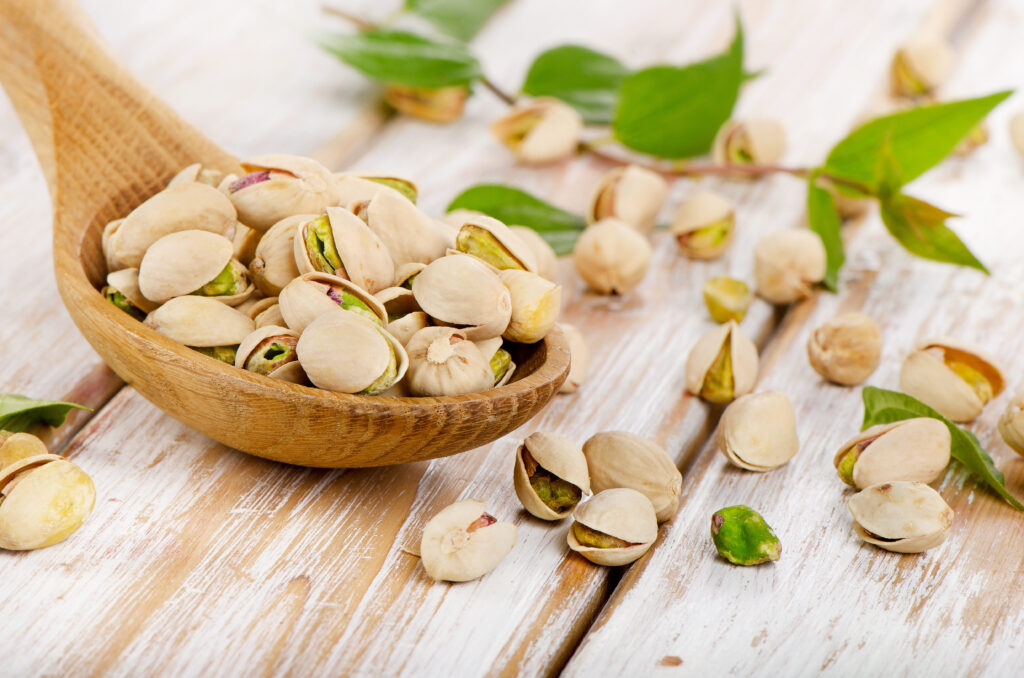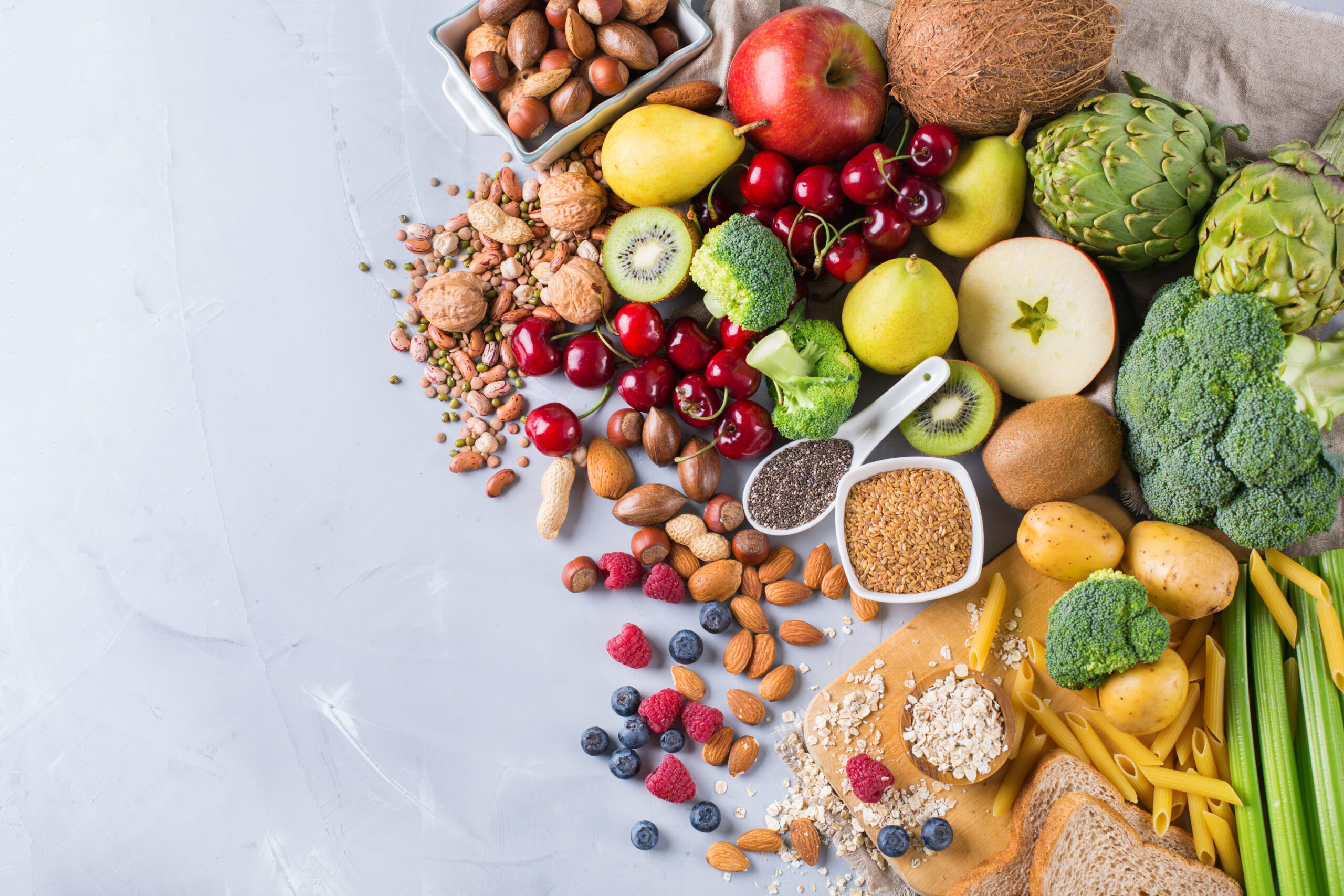Fiber is an essential nutrient that plays a vital role in maintaining digestive health, regulating blood sugar levels, and promoting overall well-being. Yet, many people fail to meet their daily fiber requirements.
Including more fiber-rich foods in your diet is an easy way to boost your health without complicated changes.
From fruits to legumes and grains, these foods can help improve your digestive system, heart health, and even support weight management.
This blog will explore the importance of fiber, its health benefits, and a variety of fiber-rich foods you can incorporate into your diet.
What is Fiber?
While there is no specific definition for fiber, it is currently recognised as a type of carbohydrate that the body cannot digest. Fiber passes through small intestine without being broken down and reaches large intestine where it gets partially or fully fermented. Fiber is classified into four types:
- Dietary fiber includes non-digestible carbohydrates and lignin found in plants. Dietary fiber is naturally present in plants and cannot be digested in the small intestine.
- Added fiber is extracted from plants or animals and can help with blood sugar, cholesterol, and digestion.
- Soluble fiber dissolves in water, forms a gel, and is fermented in the colon. Examples: fruits, oats, legumes, and most root vegetables.
- Insoluble fiber doesn’t dissolve in water and helps form stool, thereby preventing constipation. Examples: whole grains, nuts, seeds, skin of fruits and vegetables.
Why is Fiber Important?
Fiber is not just for digestion; it offers a range of health benefits that are crucial for maintaining overall well-being:
1. Improves Gut Health
Dietary fiber feeds beneficial gut bacteria, acting as a prebiotic. During fermentation, it produces short-chain fatty acids (SCFAs) that support digestion, immunity, and metabolism. A fiber-rich diet strengthens the gut barrier, promoting overall health and reducing disease risk (3).
A high-fiber diet also helps prevent the development and progression of piles and diverticular disease (1).
2. Helps Maintain a Healthy Weight
High-fiber foods are usually low in calories but take longer to digest, keeping you fuller for longer. This makes fiber a key player in weight management. Studies have shown that people who consume a high-fiber diet tend to have lower body weights (1, 3).
3. Regulates Blood Sugar Levels
Soluble fiber helps slow down the digestion and absorption of sugar into the bloodstream, which can prevent spikes and crashes in blood sugar levels (1, 3). This makes fiber particularly beneficial for people with type 2 diabetes or those trying to manage their blood sugar levels
4. Reduces Cholesterol
Soluble fiber helps reduce bad cholesterol (LDL) levels in the bloodstream. It binds to cholesterol and bile acids in the intestines, preventing their absorption and reducing the amount of cholesterol circulating in the body (1).
In fact, fiber consumption is associated with the reduced risk of heart diseases (3).
5. Reduces the Risk of Cancer
Dietary fiber can help reduce the risk of colorectal cancer. Additionally, pectin, a type of soluble fiber, has antioxidant properties that may lower the risk of other cancers, such as breast cancer (1, 3).
6. Promotes Longetivity
Research suggests that a higher fiber intake may lower the risk of all-cause mortality. Dietary fiber promotes longevity by boosting immunity and reducing the risk of chronic diseases like heart disease, diabetes, and cancer (1, 3).
How Much Fiber Do You Need?
The recommended daily intake of fiber varies based on age, sex, and individual needs. Generally, most people need:
- 25 grams of fiber per day for women
- 38 grams of fiber per day for men
However, most people consume much less than the recommended amount, often falling short by 10-20 grams per day.
What foods are high in fiber?
Fiber comes from plant foods such as fruits, vegetables, legumes, whole grains, nuts, and seeds. Below are 28 of the best foods high in fiber to include in your daily diet.
1. Black Beans
Beans are among the most fiber-packed foods available, and black beans are no exception.
A cup (172 grams) of cooked black beans provides 15 grams of fiber or 8.7 grams per 100 grams.
They are also a good source of essential minerals and B-vitamins. Additionally, being darker, blacks beans tend to contain higher levels of polyphenols, particularly anthocyanins compared to lighter beans.
They can be used in a variety of dishes, such as soups, salads, tacos, and even dips like black bean hummus.
Other types of beans high in fiber (100 grams, cooked):
- Chickpeas: 7.6 grams
- Navy beans: 10.5 grams
- Kidney beans: 6.4 grams
- Adzuki beans: 7.3 grams
2. Lentils
Lentils are another fiber-rich legume that can greatly improve your diet.
A cup (198 grams) of cooked lentils offers 15.6 grams of fiber or 7.9 grams per 100 grams.
In addition to being high in fiber, lentils are a great source of protein, iron, and folate.
You can add lentils to soups, stews, salads, or blend them into veggie burgers for a nutritious meal.
3. Guava
Guava is one of the fruits with highest amount of fiber. One cup (165 grams) of guava is packed with around 8.9 grams of fiber or 5.4 grams per 100 grams.
Beyond fiber, guava is also a great source of potassium, copper, manganese, and B vitamins. Plus, it’s exceptionally rich in vitamin C, helping to boost immunity and fight free radicals.
You can enjoy guava raw, sliced fresh, or sprinkled with salt and chili powder for a flavorful twist. It also blends well into smoothies and adds a refreshing touch to fruit salads.
4. Oats
Oats are a well-known breakfast staple, and they are also an excellent source of fiber.
A cup (156 grams) of raw oats provides about 16.5 grams of fiber or 10.6 grams per 100 grams.
The soluble fiber in oats, particularly beta-glucan, has been shown to lower cholesterol levels and support heart health.
Try them in oatmeal, overnight oats, or blend them into smoothies to start your day with a nutritious fiber boost.
5. Quinoa
Quinoa is a pseudocereal high in fiber and plant-based protein.
This gluten-free grain that contains around 5 grams of fiber per cooked cup (185 grams) 2.8 grams per 100 grams.
Quinoa is also rich in essential minerals, B-vitamins and vitamin E.
Use quinoa as a base for salads, bowls, or as a side dish to accompany your main meal.
6. Brown Rice

Brown rice is a whole grain that is higher in fiber than its white counterpart.
One cooked cup (195 grams) of brown rice provides 3.5 grams of fiber 1.8 grams per 100 grams.
Brown rice can be used in a variety of dishes, from stir-fries to pilafs, making it an easy addition to any meal.
7. Whole Wheat Pasta
Whole wheat pasta provides a higher fiber content than traditional white pasta.
With 3.9 grams of fiber per 100 grams of cooked whole wheat pasta, it’s an excellent choice for anyone looking to increase their fiber intake.
Whole wheat pasta is also a great source of magnesium and selenium. They can be paired with a variety of vegetables, sauces, and proteins for a healthy, filling meal.
8. Apples
An apple a day not only keeps the doctor away but also provides a good amount of fiber.
Apples contain both soluble and insoluble fiber, which can help regulate blood sugar levels and prevent constipation.
One medium-sized (200 grams) apple contains 4.8 grams of fiber or 2.4 grams per 100 grams.
They are easy to snack on and can also be added to salads, smoothies, or baked into desserts.
9. Pears
Pears are another fantastic fruit for increasing fiber intake, offering around 5.5 grams of fiber per medium-sized fruit (178 grams) or 3.1 grams per 100 grams.
Pears are also high in antioxidants and vitamin C, which help support immune health.
You can enjoy them as a snack or slice them into salads, smoothies, or baked goods for an added fiber boost.
10. Raspberries
Raspberries are one of the highest fiber fruits available, providing an impressive 8 grams of fiber per cup (123 grams) 6.5 grams per 100 grams.
These vibrant berries are rich in antioxidants, particularly anthocyanins and vitamin C, which helps protect the body from free radicals.
Add raspberries to yogurt, oatmeal, or smoothies, or simply enjoy them on their own as a delicious and healthy snack.
11. Bananas
While not as fiber-dense as some other fruits, bananas still provide a modest amount of fiber.
One banana (126 grams) contains 3.28 grams of fiber or 2.6 grams per 100 grams.
Bananas are a great source of potassium, which helps regulate blood pressure. You can eat bananas on their own, add them to smoothies, or top your oatmeal with them for a quick and nutritious snack.
12. Avocados

Avocados are a great source of healthy fats, but they’re also packed with fiber.
A single cup (150 grams) of avocado cubes contain 10 grams of fiber or 6.7 grams per 100 grams.
The high fiber content, combined with heart-healthy fats, makes avocados a perfect addition to any meal, especially for a weight loss diet.
Check the list of other foods that aid in weight loss here!
13. Broccoli
Broccoli is not only high in fiber, but also rich in vitamins, minerals, and antioxidants. It supports immune health, bone health, and digestion.
A half-cup (78 grams) of chopped broccoli contains around 2.5 grams of fiber or 3.3 grams per 100 grams.
Broccoli can be enjoyed steamed, roasted, or added to soups, stir-fries, and salads for a fiber-packed addition to your meal.
14. Carrots
Carrots are an excellent source of fiber, with a carrot (60 grams) containing 1.68 grams, or 2.8 grams per 100 grams.
They also provide a wealth of vitamins and minerals, particularly beta-carotene, which is converted into vitamin A in the body.
Carrots are great raw as a snack, or they can be added to soups, stews, or roasted alongside other vegetables.
15. Brussels Sprouts
Brussels sprouts are a cruciferous vegetable packed with antioxidants and nutrients, including potassium, vitamin A, C, K, folate, and other B-vitamins.
One half-cup (78 grams) of brussels sprouts provide about 2 grams of fiber or 2.6 grams per 100 grams.
Roasted, sautéed, or steamed, Brussels sprouts are a delicious and nutritious addition to any meal.
16. Sweet Potatoes
Sweet potatoes are a fiber-rich root vegetable packed with carbs and fiber.
One medium-sized (151 grams) sweet potato contains about 3.8 grams of fiber or 2.5 grams per 100 grams.
They are also an excellent source of vitamin A, which supports vision and immune function. You can bake, mash, or roast sweet potatoes as a nutritious side dish or include them in soups and casseroles.
17. Spinach
Spinach is a leafy green that provides around 4 grams of fiber per cooked cup (180 grams) or 2.4 grams per 100 grams.
In addition to fiber, spinach is rich in iron, calcium, and antioxidants.
It’s a versatile vegetable that can be used in salads, soups, smoothies, or sautéed as a side dish.
18. Almonds
Almonds are a delicious and nutritious snack packed with essential nutrients. They are particularly rich in fiber, providing 3.5 grams per ounce (28 grams)
They are also rich in healthy fats, protein, and vitamins and minerals.
Snack on almonds throughout the day, or add them to salads, yogurt, and smoothies for a satisfying and nutritious boost.
19. Chia Seeds
Chia seeds are incredibly rich in fiber. Just an ounce-serving (28 grams) of chia seeds contain about 10 grams of fiber.
These tiny seeds are also rich in omega-3 fatty acids and protein.
You can add chia seeds to smoothies, make chia pudding, or sprinkle them over salads and yogurt to increase your fiber intake.
20. Flaxseeds
Flaxseeds are another fiber-packed food, offering 6.4 grams of fiber per ounce (28 grams). They are also an excellent source of healthy fats, protein, and antioxidants.
Ground flaxseeds can be added to smoothies, baked goods, or sprinkled over cereal and salads for an easy fiber boost.
21. Pistachios

Pistachios are a fiber-rich nut, providing 3 grams of fiber per ounce (28 grams). They are also packed with healthy fats, protein, and antioxidants.
Snack on pistachios or add them to salads, baked goods, or as a topping for yogurt for a crunchy fiber-packed treat.
22. Blackberries
Blackberries are another berry with a high fiber content. They are also loaded with antioxidants and vitamin C.
One cup (144 grams) of blackberries offer about 7.6 grams of fiber or 5.3 grams per 100 grams.
Enjoy blackberries on their own, or add them to yogurt, smoothies, or salads for a sweet and healthy boost.
23. Air-popped Popcorn
Air-popped popcorn is a whole grain and a great snack packed with fiber while being low in calories.
Just an ounce-serving (28 grams) of provides around 4 grams of fiber.
When made without butter or excessive salt, popcorn can be a healthy, fiber-filled snack option. Add herbs or nutritional yeast for extra flavor without compromising its health benefits.
24. Artichokes
Artichokes are an excellent source of dietary fiber, providing about 6.84 grams per medium-sized artichoke (120 grams).
They also contain magnesium, copper, manganese, vitamin C, K, and folate.
Additionally, artichokes contain inulin, a prebiotic fiber that nourishes beneficial gut bacteria, enhancing gut microbiome balance and overall digestive health. In fact, it has been shown to promote metabolic health.
25. Dark Chocolate
Dark chocolate isn’t just a treat—it’s a fiber-rich delight!
A bar (101 grams) of 70-85% dark chocolate packs 11 grams of fiber, supporting digestion and satiety.
Plus, it’s loaded with antioxidants and minerals, making it a guilt-free indulgence when enjoyed in moderation. Opt for high-cocoa varieties for maximum benefits!
26. Dried Fruits
Dried fruits are nutrient-dense and used in snacks, desserts, and cooking. Fiber content of some common dried fruits (per 40-gram serving):
- Raisins: 1.8 grams
- Dates: 3.2 grams
- Figs: 3.92 grams
- Apricots: 2.92 grams
- Prunes: 2.84 grams
- Cranberries: 2.12 grams
However, they are also higher in sugar and calories than fresh fruits. It’s essential to consume them in moderation (30-40 grams per serving).
27. Coconut
Coconut, a tropical fruit, is a rich source of dietary fiber, supporting digestion, gut health, and blood sugar regulation.
A single cup (80 grams) of shredded coconut provides 7.2 grams of fiber or 4 grams per one piece (45 grams).
Coconut is also rich in healthy fats, particularly medium-chain triglycerides (MCTs), which support energy production, metabolism, and brain function.
Whether in shredded, dried, or fresh form, coconut adds natural fiber to the diet.
28. Hazelnuts
Hazelnuts are a tasty and nutritious nut loaded with essential nutrients. One ounce-serving (28 grams) of hazelnuts provide around 2.7 grams of fiber.
They also offer healthy fats, protein, vitamins, and minerals, making them a great addition to a balanced diet.
Enjoy hazelnuts as a snack, mix them into granola, sprinkle over salads, or blend them into smoothies for a delicious and fiber-rich boost!
The Bottom Line
Incorporating fiber-rich foods into your diet is an easy and effective way to boost your health. From legumes and grains to fruits, vegetables, and nuts, these foods can help improve digestion, manage weight, and support heart health.
By making simple swaps, like choosing whole grains or adding more fruits and vegetables, you can easily increase your fiber intake and enjoy the wide range of health benefits that come with it.
References:
- National Institutes of Health (NIH): StatPearls
- U.S. Department of Agriculture FoodData Central
- Barber TM, Kabisch S, Pfeiffer AFH, Weickert MO. The Health Benefits of Dietary Fibre. Nutrients. 2020 Oct 21;12(10):3209. doi: 10.3390/nu12103209. PMID: 33096647; PMCID: PMC7589116.
- Mullins AP, Arjmandi BH. Health Benefits of Plant-Based Nutrition: Focus on Beans in Cardiometabolic Diseases. Nutrients. 2021 Feb 5;13(2):519. doi: 10.3390/nu13020519. PMID: 33562498; PMCID: PMC7915747.
- Cicero AFG, Fogacci F, Veronesi M, Strocchi E, Grandi E, Rizzoli E, Poli A, Marangoni F, Borghi C. A randomized Placebo-Controlled Clinical Trial to Evaluate the Medium-Term Effects of Oat Fibers on Human Health: The Beta-Glucan Effects on Lipid Profile, Glycemia and inTestinal Health (BELT) Study. Nutrients. 2020 Mar 3;12(3):686. doi: 10.3390/nu12030686. PMID: 32138344; PMCID: PMC7146517.
- Visuthranukul, C., Sriswasdi, S., Tepaamorndech, S. et al. Enhancing gut microbiota and microbial function with inulin supplementation in children with obesity. Int J Obes 48, 1696–1704 (2024). https://doi.org/10.1038/s41366-024-01590-8.
Note: Some of the references above are used under open-access licence CC BY 4.0.
